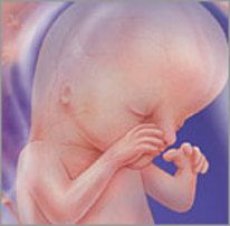Medical expert of the article
New publications
Pregnancy: 13 weeks
Last reviewed: 08.07.2025

All iLive content is medically reviewed or fact checked to ensure as much factual accuracy as possible.
We have strict sourcing guidelines and only link to reputable media sites, academic research institutions and, whenever possible, medically peer reviewed studies. Note that the numbers in parentheses ([1], [2], etc.) are clickable links to these studies.
If you feel that any of our content is inaccurate, out-of-date, or otherwise questionable, please select it and press Ctrl + Enter.

How the child grows:
Tiny fingertips are already showing fingerprints, the baby's veins and organs are clearly visible through the thin skin, and the size of the torso is slowly beginning to equal the size of the head. If you're having a girl, her ovaries already contain more than 2 million eggs. Your baby has grown to almost 8 cm in length and weighs almost 28 grams.
Important: Each baby's development is unique. Our information is designed to give you a general idea of fetal development.
Changes in the expectant mother
It's the last week of the first trimester, and the risk of miscarriage is much lower now. Next week will mark the start of the second trimester, a time of relative comfort for many women, as early pregnancy symptoms such as morning sickness and fatigue fade. And here's some more good news: many couples also notice an increased libido at this time. The birth is still a long way off, but your breasts may already be leaking colostrum, the nutrient-rich fluid that will feed your baby for the first few days after birth.
3 Questions... Food for two
- How much should I eat daily?
You need about 300 extra calories a day during pregnancy than you did before. Try to count calories this way: skip a heavy meal and have a glass of milk with whole grain toast instead.
Don't be obsessed with quantity, it's better to focus on the quality of your food.
- What nutrients are needed most right now?
Protein, iron, and calcium are three essential nutrients needed to keep you and your baby healthy.
Protein: Ideally, you should get up to 71 grams per day. Lean meats, eggs, and dairy products, as well as nuts, beans, and soy products, are good sources of protein. Eating three meals a day will help you reach your goal. Fish is a good source of protein (as well as healthy omega-3 fats), but because of possible water contamination and debate among experts, you should consult your doctor about the type and amount of fish you can safely eat.
Iron: 27 milligrams of iron a day is especially important to prevent iron deficiency anemia, a common problem among pregnant women. Iron from animal products is more easily absorbed by the body than iron from plants. The best source? Lean meats. If you're a vegetarian, eat spinach and beans; these sources aren't as rich in iron as meat, but they can still provide you with some. Vitamin C helps absorb plant-based iron, so experts recommend citrus fruits, strawberries, and bell peppers.
Calcium: Four servings of dairy products a day will provide you with 1,000 mg of calcium. Your baby needs calcium to build bones and teeth. If he doesn’t get enough of this nutrient, then he will take it from your body and you will lose the calcium that your bones need.
- Do I need to track my diet if I take prenatal vitamins?
Yes! Although prenatal vitamins contain all the minerals that pregnant women need, they are not intended to replace a healthy diet. It is important to eat plenty of fresh fruits and vegetables, as fiber helps with digestion. In fact, if you are a healthy woman who eats a healthy, balanced diet, taking a multivitamin and minerals is not necessary. However, experts believe that taking folic acid before conception and during the first trimester, and iron during the second and third trimesters is necessary.
This week's activity: Share your proposed parenting methods with your partner. To start the conversation, try a creative approach: take a piece of paper and make a list called "My mother always..." and "My mother never..." and "My father always..." and "My father never...". After making the list, discuss your findings with your partner, thinking about what you would like to keep and what you would like to add when raising your own child.


 [
[